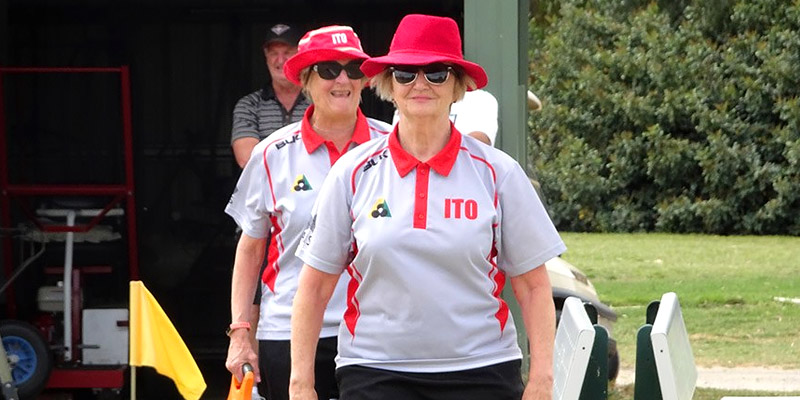“Play it Again, Sam.”
Even though Humprey Boghart never actually said ‘Play it again, Sam!’ in the film Casablanca (1942) it reminds me of the many times I hear how umpires solve a problem on the green by declaring the end dead and so it’s ‘Play it again, Sam!’ Most umpires are motivated by the desire to be “fair” in all situations, however, in many of these situations the Laws of the Sport do not allow the end to be declared dead and therefore replayed.
In which of the following scenarios has the umpire made the correct call? When should an end be declared dead?
- Player A is on the mat and delivers a bowl and hits Skip B’s shoe and but causes no further disturbance of the head. The umpire is called and asks Skip A to place the bowl where it would have come to rest. Skip A says he wouldn’t have a clue where the bowl would have ended up. Skip B says it would have ended up in the ditch. Skip A disagrees. The umpire says oh well, then let’s call it a dead end. “Play it again Sam!”
- Towards the end of a very close and tense match Skip B is 4 down and delivers the bowl from off the side of the mat, the bowl changes the head and Team A is now 2 up. Skip B calls the umpire and complains the bowl was illegally delivered and should not count. The umpire stated that there was no way they could reinstate the head, so she will call it a dead end. “Play it again, Sam!”
- Team A on a changeover were 4 up. The third from Team A walks into the head to direct his skip who has just left the head. Without looking the third from team A accidently walks into the head and kicks and disturbs several of the shot bowls. The umpire was called and advises the third from Team B to replace the bowls. The third claims he had no idea where the bowls should be replaced, and the Skip of his team claimed the same. The umpire then declared the end dead. “Play it again, Sam!”
- During a game a heavy down pour causes several bowlers to take shelter or to fumble through their bowls bags searching for their wet weather gear. Some players remain on the green. After 8 minutes all players recommence their game. One skip calls for the umpire and stated we need to repay all the ends as we stopped playing. The umpire concurred and declared it a dead end. ‘Play it again, Sam!’
- A bowl at rest in the rink of play splits into pieces without having been struck by another bowl. The umpire is called and asks if the player has another bowl from the same set. The player says that she does. The umpire then declared the end and the player goes to retrieve her other bowl. “Play it again, Sam!”
How many of these umpire’s decisions declaring a dead end were correct? Your answer?
The correct answer is that in all the above scenarios the umpires call was incorrect. No end should have been declared dead.
Explanation:
-
- Law 37.1.1.3 states that if a bowl is displaced by an opponent and it has not disturbed the head the skip A can choose whether to have the bowl replayed (Law 37.1.1.3.1), place the bowl where Skip A believes it would have come to rest (37.1.1.3.2) or leave the bowl where it comes to rest (37.1.1.3.3). The end cannot be declared dead and Skip B should not have become involved.
-
- This scenario is clearly a matter of foot faulting. Skip B has not met the requirements of Law 7.1. Any player not meeting the terms of Law 7 is committing a foot fault and Law 8 will apply. Law 8.1 states that on the first occasion the player must be warned in the presence of their skip. On each occasion after this, the umpire must have the bowl stopped and declared dead – Law 8.2. Note that if it has not been possible to stop the bowl and it disturbs the head, the end can be declared dead. Law 8.3.3. As this was the first occasion Skip B foot faulted, the umpire was incorrect in declaring the end dead.
-
- Law 37.1.4 covers the displacement of a bowl at rest. Law 37.1.4.2 covers this scenario and states that the opposing skip (or their third if the skip has delegated) must put the bowls back into their former position and replace any part of the head disturbed after the displacement. Not an easy task but certainly not a situation for the umpire to declare a dead end. Consider, then any player could use this ploy to their advantage to deliberately cause an end to be replayed. The end should not have been declared dead.
-
- This scenario is covered by Law 33, leaving the green during play. If a player must leave during the course of a team game for a reasonable cause they must return within 10 minutes. After ten minutes a substitute can be introduced under condition set out in DR 2.4. In the above scenario player/s were off the green for less than ten minutes so there is no provision within the Laws of the Sport to declare a dead end. This is very different to a stoppage of play (Law 32) which states in Law 32.2 and Law 32.3 that if an end has started and not all bowls have been played or the number of shots determined it must be declared dead. For players to remain off a green for more than 10 minutes it must be declared a stoppage by agreement of the side managers or if not in agreement by the umpire.
- Law 31.4 states that in such a situation the bowl must be replaced with another bowl from the same and the end continued. The end should not have been declared dead.
Note: If for some reason a player refused to replace the bowls to their original position, what could an umpire do? An umpire would need to use all their best diplomatic skills to encourage the player to do as requested. If a player was still refusing the only option remaining would be to inform them that under definition C2 they could become a defaulting player and under C10 have the game awarded to their opponent.
Officials need to make sure that if they declare a dead end it must be sanctioned by the Laws of the Sport. This is in all situations regardless of whether they think it may be the “fairest” way to resolve a situation. Clearly, it’s not always a case of ‘Play it again, Sam!’
Happy officiating and have fun.
John Roberts
Chairman, Officiating and Laws Committee.




